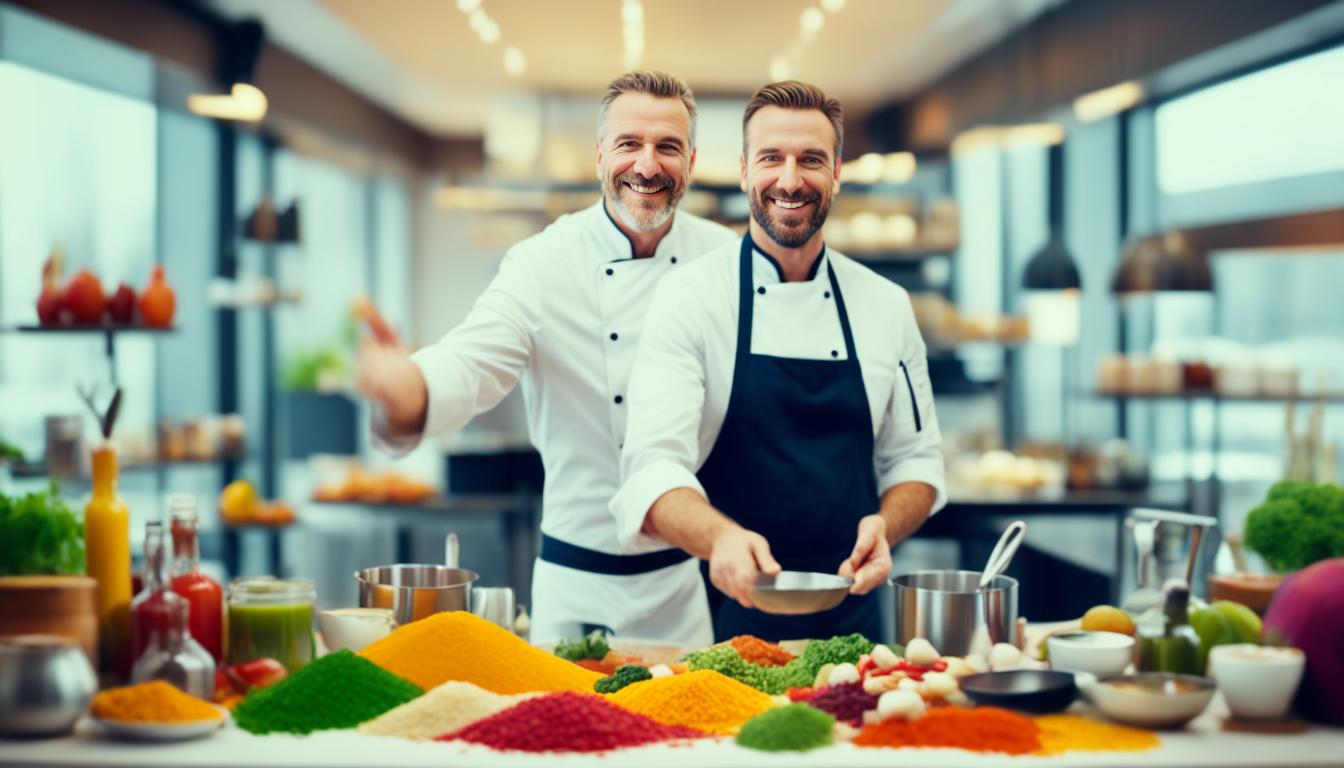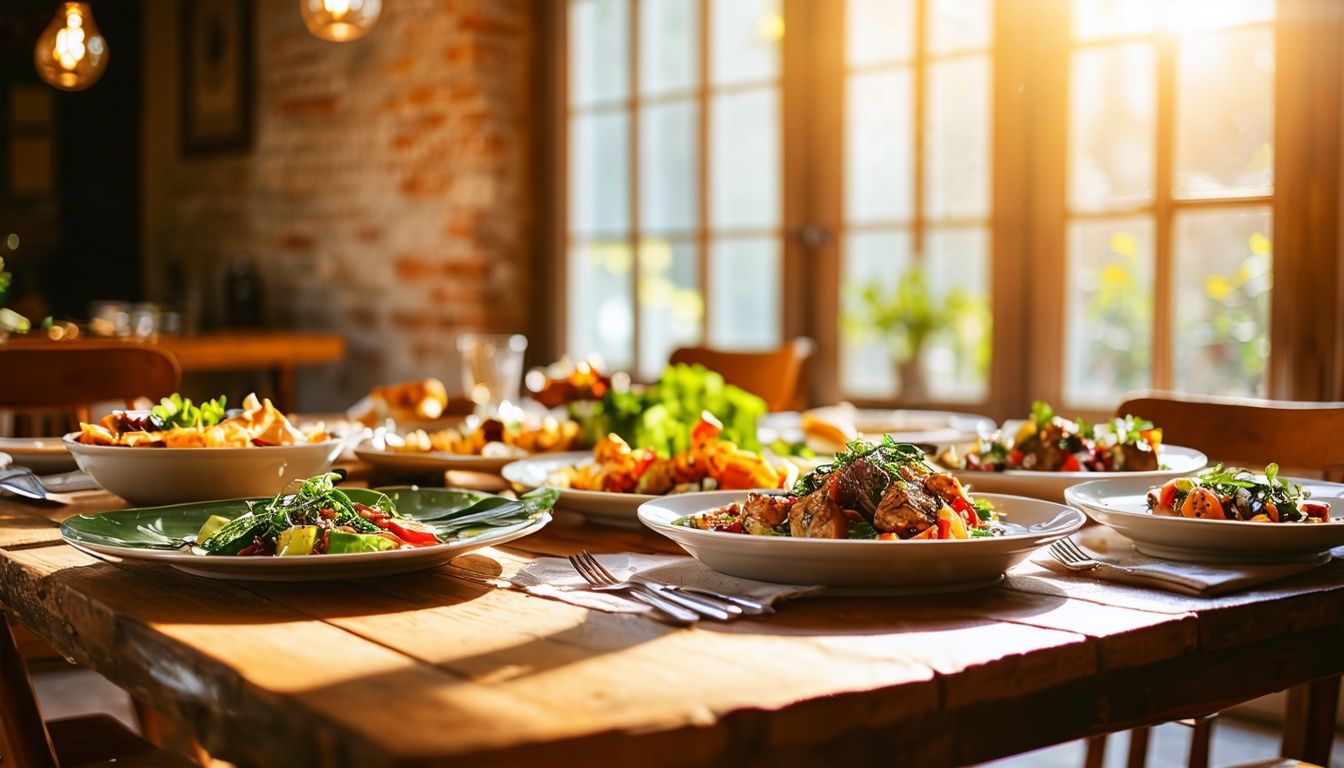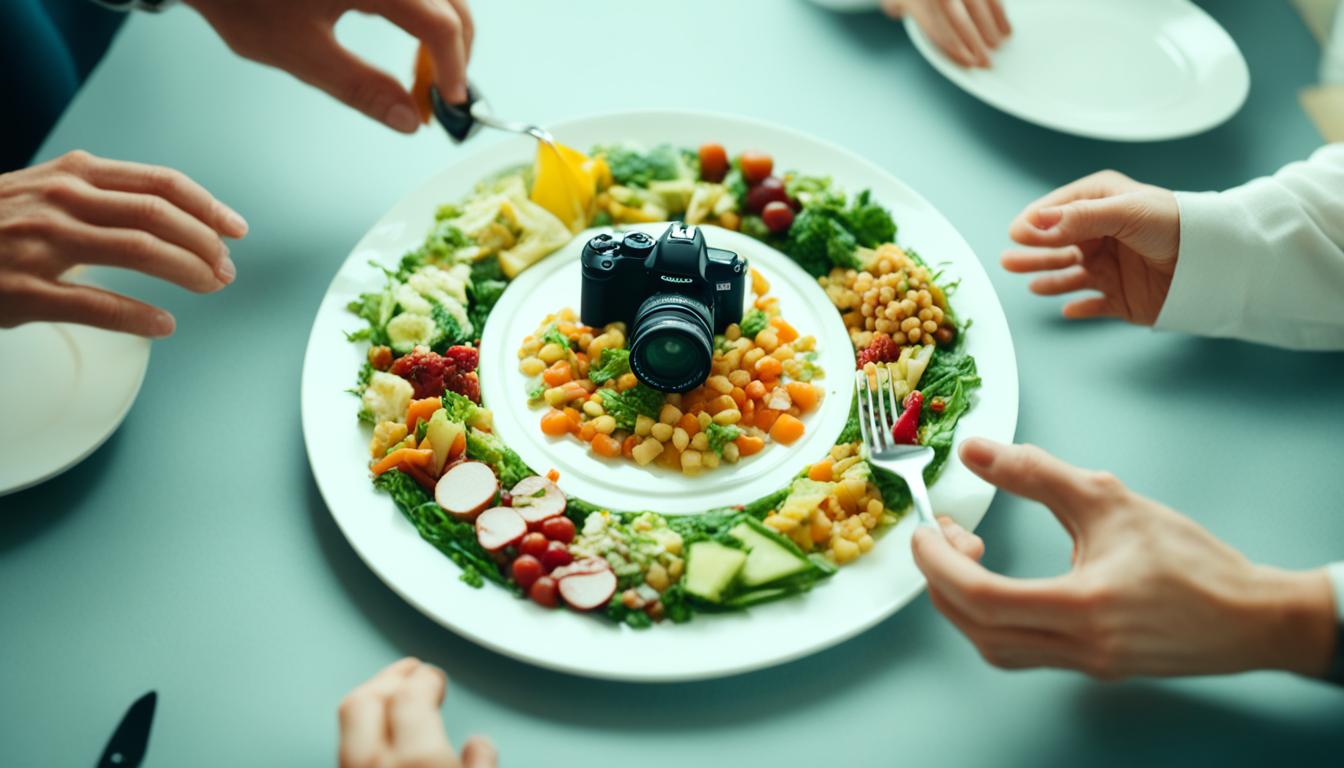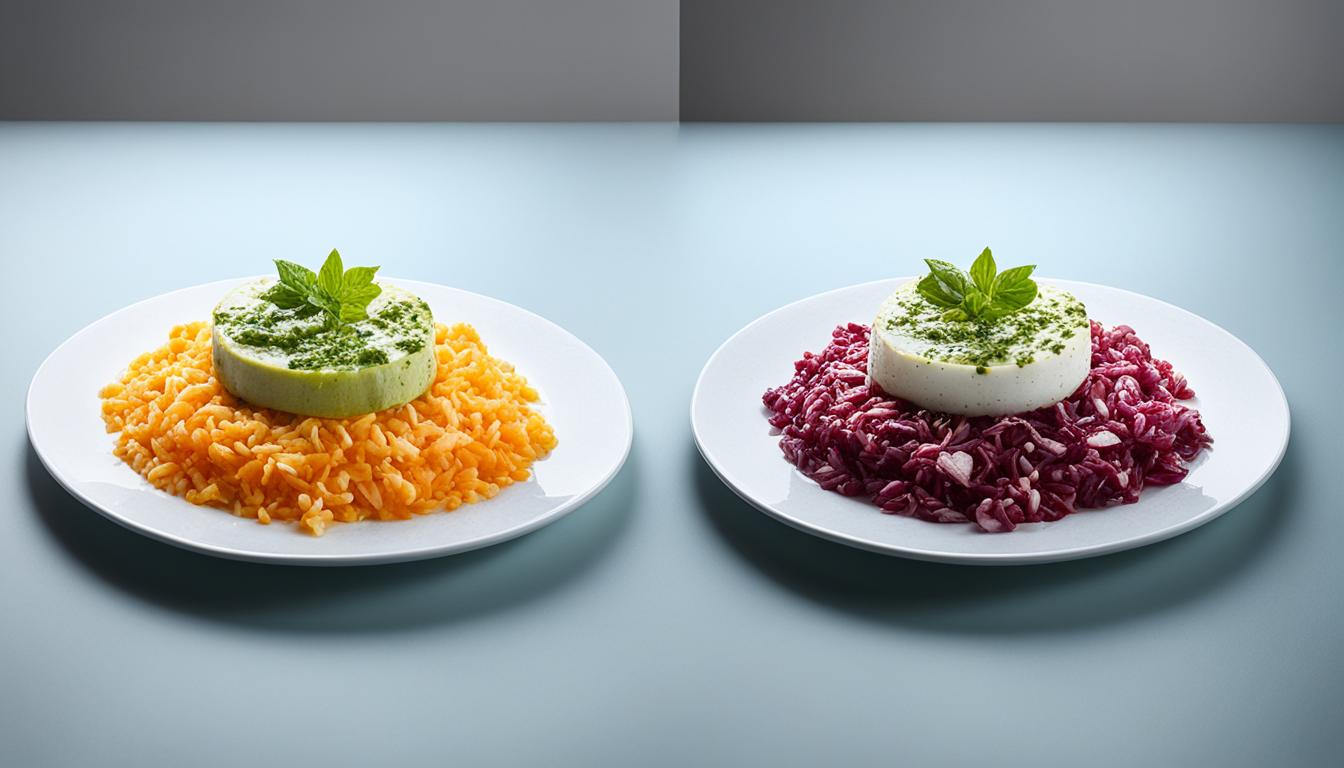Welcome to our guide on culinary collaboration and chef partnerships in the restaurant industry. At our {brand name}, we understand the importance of working together with other chefs to create successful dining experiences and elevate the culinary industry.
Culinary collaboration brings together a diverse range of skills, expertise, and perspectives, resulting in innovative dishes, memorable flavors, and satisfied customers. In this guide, we will explore the key factors that contribute to successful collaborations, from defining roles and responsibilities to effective communication and problem-solving.
Key Takeaways:
- Clarify roles and responsibilities to avoid duplication of tasks
- Embrace diversity and leverage different culinary expertise
- Communicate effectively and coordinate processes in the kitchen
- Proactively solve problems and conflicts constructively
- Celebrate successes and achievements to foster a positive working environment
Define roles and responsibilities
In order to ensure a smooth and efficient operation in the kitchen, it is essential to define the roles and responsibilities of each team member. By clarifying the tasks and expectations, we can avoid confusion or duplication of efforts. Assigning tasks based on the strengths and capabilities of each chef also helps maximize productivity and efficiency.
One effective way to track duties is by using charts or checklists. These visual tools can provide a clear overview of tasks such as prep work, cooking, plating, cleaning, and ordering. By having a structured system in place, we can ensure that each task is completed in a timely manner and nothing falls through the cracks.
At our establishment, we believe in maintaining clear and regular communication with the team. This helps to foster a sense of unity and ensures everyone is aware of their responsibilities and expectations. Effective communication can prevent misunderstandings, improve teamwork, and ultimately contribute to a successful culinary experience.
Sample Task Allocation:
| Chef | Main Responsibilities |
|---|---|
| Chef A | Menu planning and recipe development |
| Chef B | Food ordering and inventory management |
| Chef C | Preparation and cooking of appetizers |
| Chef D | Main course preparation and plating |
| Chef E | Dessert creation and presentation |
| Chef F | Overall kitchen cleanliness and organization |
Respect and appreciate diversity
Embrace the diversity of your team as a source of strength and creativity. At Culinary Expertise, we understand the value of different perspectives, skills, and experiences brought by our chefs. By actively listening and learning from each other, we can explore new ways to improve recipes, techniques, and presentation in our food service partnerships. Together, we can push culinary boundaries and elevate the dining experience for our customers.
Our Chef Consulting services emphasize the importance of appreciating the contributions of every member of our team. We believe in showing appreciation through positive feedback and recognition. When chefs’ unique talents are acknowledged and valued, it fosters a culture of respect and collaboration. Recognition not only motivates our team, but it also instills a sense of pride in their culinary craftsmanship.
“Diversity is the key to innovation in the culinary world.”
We encourage our chefs to share their cultural backgrounds, family traditions, and personal experiences. This sharing of knowledge and expertise allows us to embrace the richness and diversity of flavors, ingredients, and cooking techniques. It also enables us to cater to a wider range of tastes and preferences, ensuring that our food service partnerships reach diverse communities.
In our continuous pursuit of excellence, we celebrate the fusion of culinary cultures and the global influence on our delicious creations. From Asian spices to Latin American flavors, we celebrate the diversity that enriches our menu and makes it truly exceptional.
Strengthening Partnerships through Collaboration
We believe that respect for diversity is not just limited to our internal team. It extends to our food service partnerships as well. By embracing the unique perspectives and experiences of our clients and collaborating with their goals and visions, we build strong and enduring relationships.
At Culinary Expertise, we offer customized solutions through our Chef Consulting services. Our consultants work closely with restaurant owners, managers, and chefs to create collaborative strategies that align with their business objectives. By incorporating diverse perspectives, we help our partners enhance their menus, optimize their operations, and surpass culinary expectations.
Together, we celebrate the power of collaboration and diversity, creating culinary experiences that leave a lasting impression on both our team and our clients.
| Benefits of Embracing Diversity in Culinary Partnerships | Why it Matters |
|---|---|
| Enhanced creativity and innovation in menu development | Different perspectives lead to unique flavor combinations and culinary techniques. |
| Expanded market reach and appeal | By catering to diverse tastes and cultural preferences, restaurants can attract a wider customer base. |
| Inclusivity and representation | Recognizing and valuing diverse cultures and culinary traditions creates an environment of inclusivity in the restaurant industry. |
| Broadened culinary expertise | Chefs from diverse backgrounds bring their individual skills and knowledge, contributing to a richer culinary experience. |

Communicate and coordinate effectively
Effective communication and coordination are essential for quality, consistency, speed, and efficiency in the kitchen. At [Restaurant Name], we understand the importance of seamless collaboration among chefs to deliver exceptional culinary experiences. To ensure smooth operations and excellent teamwork, we utilize a range of tools and strategies that enhance communication and coordination.
Utilize Tools and Strategies
Menus, recipes, schedules, timers, and signals are just a few examples of the tools we leverage to streamline communication and coordination in our kitchen. By having well-designed menus and easily accessible recipes, our chefs can stay organized and ensure consistency in our dishes.
An example of a typical daily schedule for our team:
| Time | Activity |
|---|---|
| 7:00 AM | Prep work and ingredient inventory |
| 9:00 AM | Cooking and plating |
| 1:00 PM | Break and team meeting |
| 2:00 PM | Cleaning and sanitizing |
By following a well-structured schedule, our chefs can stay in sync and ensure efficient operation of the kitchen throughout the day.
Effective Verbal and Non-Verbal Communication
Clear and respectful communication is vital for efficient kitchen operations. Our chefs master the art of effective verbal and non-verbal cues to convey information and instructions. Everyone understands that open and honest communication promotes teamwork and avoids misunderstandings.
“Communication works for those who work at it.” – John Powell
Whether it’s providing clarity on a recipe instruction or sharing a suggestion to enhance a dish, our chefs use their expertise to communicate effectively and maintain a harmonious working environment.
Regular Updates and Adaptations
As technology and the culinary landscape evolve, it’s crucial to stay updated and adapt our communication methods accordingly. We regularly assess our communication tools and strategies, making necessary adjustments to keep up with the changing times.
Solve problems and conflicts constructively
In any collaborative endeavor, it is inevitable to encounter problems and conflicts. However, rather than viewing them as obstacles, we should see them as opportunities for positive resolution. Adopting a proactive, problem-solving attitude is crucial for maintaining a harmonious working environment.
When faced with a problem or conflict, it is important to encourage teamwork and collaboration. By involving everyone in the process, we can tap into the collective wisdom and find fair and respectful solutions. Brainstorming sessions allow us to generate innovative ideas and approaches, while negotiation and mediation techniques help in reaching mutually beneficial agreements.
Furthermore, we should embrace the mindset of continuous learning and growth when handling situations. Being open to learning from each other’s experiences and perspectives allows us to broaden our problem-solving skills and consider alternative solutions. By teaching and learning from one another, we can develop more effective strategies for resolving conflicts and achieving positive outcomes.
“In the midst of every difficulty lies opportunity.” – Albert Einstein

Celebrate successes and achievements
At our restaurant, we understand the importance of celebrating individual and collective successes and achievements. Not only does it boost the confidence and motivation of our team members, but it also enhances overall team satisfaction. We believe in acknowledging and rewarding efforts that contribute to our success.
Whether it’s meeting goals, completing projects, or receiving positive reviews, we make sure to recognize the hard work and dedication of our chefs and staff. By doing so, we create a supportive environment that fosters a sense of pride and accomplishment. The recognition we offer reinforces the value we place on collaboration and teamwork.
In addition to acknowledging achievements, we also believe in organizing social events that bring our team together. These events serve as an opportunity for everyone to relax, bond, and appreciate one another’s talents. The camaraderie established during these occasions builds trust, respect, and a deeper sense of collaboration.
We are committed to cultivating a culture where every team member feels valued and their contributions are recognized. Through celebrating successes and achievements, our restaurant chef collaboration and partnerships thrive, creating a positive and inspiring atmosphere for everyone.
FAQ
What is the importance of collaborating with other chefs and restaurants?
Collaborating with other chefs and restaurants allows for the sharing of culinary expertise, knowledge, and skills. It fosters creativity, promotes innovation, and helps create unique culinary experiences for customers.
How can we define the roles and responsibilities of each team member?
To avoid confusion and duplication of tasks, it is essential to clarify the roles and responsibilities of each team member. This can be done by assigning tasks based on their strengths and capabilities and using tools such as charts or checklists to track duties. Regular communication is also crucial in ensuring everyone understands their expectations.
How can we embrace the diversity of our team?
Embracing diversity within the team is crucial for fostering creativity and innovation. Each chef brings unique perspectives, skills, and experiences to the table. It is essential to listen and learn from each other, exploring new ways to improve recipes, techniques, and presentation. Show appreciation for contributions through positive feedback and recognition.
How can we communicate and coordinate effectively in the kitchen?
Effective communication and coordination are vital for maintaining quality, consistency, speed, and efficiency in the kitchen. Utilize tools such as menus, recipes, schedules, timers, and signals. Verbal and non-verbal cues can be used to convey information and instructions clearly and respectfully. Regularly update and adapt communication methods as needed.
How should we handle problems and conflicts in the kitchen?
Problems and conflicts should be viewed as opportunities for positive resolution. It is important to adopt a proactive, problem-solving attitude and encourage teamwork and collaboration to find fair and respectful solutions. Techniques such as brainstorming, negotiation, and mediation can be used to address and resolve issues effectively.
How can we celebrate successes and achievements as a team?
Celebrating individual and collective successes and achievements is vital for boosting confidence, motivation, and team satisfaction. Acknowledge and reward efforts such as meeting goals, completing projects, and receiving positive reviews. Organize social events to foster a culture of trust, respect, and collaboration.
How Can Chefs and Restaurants Benefit from Working with Food Photographers and Their Equipment?
Chefs and restaurants can benefit from working with food photographers and their essential equipment for food photographers. High-quality photos can attract customers and increase sales. Professional equipment ensures stunning visuals that showcase the delicious dishes, leading to higher engagement and brand recognition.




